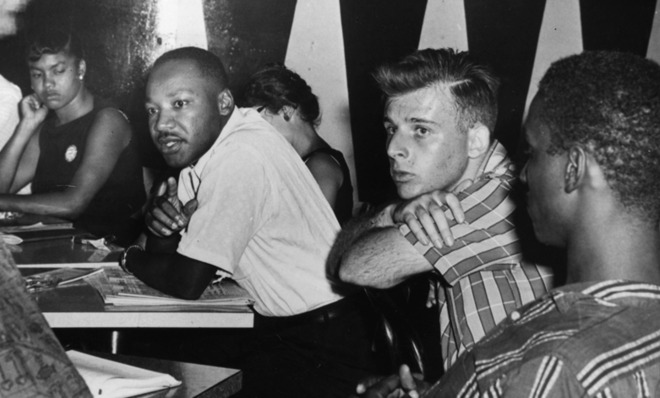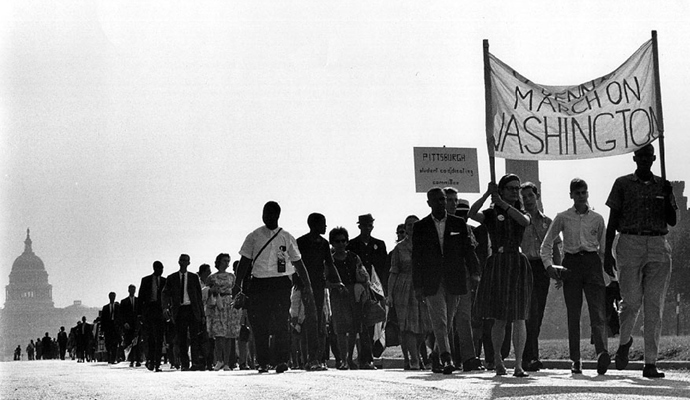Why charity can't solve society's deepest problems
Today's philanthropists fetishize workarounds of democracy in the exact same way Silicon Valley entrepreneurs celebrate "disruption"

A free daily email with the biggest news stories of the day – and the best features from TheWeek.com
You are now subscribed
Your newsletter sign-up was successful

In this season of discontent, when our sclerotic politics can't process even popular initiatives, it's tempting to see if charity can address our problems. The Gates Foundation is helping eradicate disease, you think, surely someone can help solve my pet policy challenge. But, that skips the step of other people. One way to frame this challenge is through a process we may never start, but should: reparations.
Ta-Nehisi Coates admits it: Addressing the effects of America's racist legacy will be "very, very hard." But he would cross one strategy off the list right away.
"I'm deeply, deeply skeptical of our ability to address [reparations] through philanthropy," Coates told the audience during a recent conversation with New America President Anne-Marie Slaughter about his recent article, "The Case for Reparations." "Philanthropy can't address those deep systemic things. Philanthropy can't really fix that."
The Week
Escape your echo chamber. Get the facts behind the news, plus analysis from multiple perspectives.

Sign up for The Week's Free Newsletters
From our morning news briefing to a weekly Good News Newsletter, get the best of The Week delivered directly to your inbox.
From our morning news briefing to a weekly Good News Newsletter, get the best of The Week delivered directly to your inbox.
Coates was hedging against the desire to find a frictionless method of addressing the effects of racism — challenging the effectiveness of a sector that is often held up as a solver of complex social problems.
And indeed, reparations provide a helpful crucible for testing the ambitions and role of the sector. Put simply, the only real way out is through. And philanthropy seeks not to go through the struggle-filled path of political activity but to find a way around its challenges.
Coates isn't the only one illuminating cracks in the philanthropic foundation. In a 2012 interview, Jeffrey Solomon, President of the Andrea and Charles Bronfman Philanthropies, called foundations "the passing lane of society," given their freedom to try new ideas without rigorous public scrutiny. As Harvard professor John Briscoe put it, "Philanthropists…usually come to view their priorities as more important than those set through democratic processes."
Indeed, the work of persuading a critical mass of fellow citizens to agree and take productive action is hard and often futile. Congress' partisan paralysis is no help in dispelling this perception. But the vocabulary of today's philanthropists fetishizes workarounds of democracy in the exact same way Silicon Valley entrepreneurs celebrate their ability to "disrupt." Both groups relish the ease with which they can accomplish their aims, once all competing interests are neutralized.
A free daily email with the biggest news stories of the day – and the best features from TheWeek.com
As I wrote in The Atlantic last month, philanthropist and entrepreneur Mark Ecko recently addressed a conference of young philanthropists and social entrepreneurs with the message that "for-profit is the future of non-profit." Specifically, he said, mimicking for-profit tools and "gamifying" his cause — ending corporal punishment in schools — was far more effective than lobbying state governments: "It took $6 million and eight years to change the law in one state out of 20...which is a terrible return."
Similarly, in a recent article in Stanford Social Innovation Review, Nikhil R. Sahni, Maxwell Wessel, and Clayton M. Christensen, described how "public sector innovators are improving government by replicating the market conditions that have long fostered breakthrough innovation in the private sector." One example they cite: public parking systems. An improvement to these would "require the city to migrate away from an established system that employed many workers and relied on existing infrastructure — the type of situation that has long made it difficult to implement innovations in the public sector. "
Note that innovation here seems to be a euphemism for "fewer workers" and "circumventing demands for transparency" — in other words, removing the obstacles inherent to democratic processes. Which leads to the real foible of this mentality: if a project can be made easy, (say, by not requiring oversight or negotiating with unions) then it must be an improvement, a better way of achieving social change.
Evgeny Morozov has termed this ideology "solutionism", and defines it as "an intellectual pathology that recognizes problems based on just one criterion: whether they are "solvable" with a nice and clean technological solution at our disposal."

Reparations, however, are solutionism-proof, a rebuttal to the rhetoric of philanthropists who want to achieve progress without sacrifice or, as Coates has said repeatedly, without a public process whereby we all discuss this and go through it together. As Coates said, "It's not that the state owes [black people] anything [as a separate entity], it's that we are the state. We built the state." Even conservative commentator Howard Husock, while claiming that government cannot replace charity, acknowledges that political reform provides the avenue for collective introspection and sacrifice that reparations would demand: "…to the extent that we decide, as a polity, to redistribute income for certain purposes, government can do so."
There will, and should, be friction involved in acknowledging the gut-wrenching truth of exploited labor and stolen property. Deciding as a polity to redistribute income, particularly regarding the consequences of racism, is about the most difficult mandate one can adopt in the United States. Yet the answer to a national legacy of racial oppression cannot be arrived at via "the passing lane." It demands a level of introspection and an expanded threshold for complexity. Reparations for slavery are the concrete illustration of what Morozov described in 2012:
What if the engineers are wrong and frustration, inconsistency, forgetting, perhaps even partisanship, are the very features that allow us to morph into the complex social actors that we are?…Whatever their contribution to our maturity as human beings, decisions also bring out pain and, faced with a choice between maturity and pain-minimization, Silicon Valley has chosen the latter. [The New York Times]
Coates is demanding that we now choose the former.
Reparations will be hard-fought and hotly contested, its stakeholders marshaling the full forces of persuasion and debate. Any resulting prescription, if it is to truly address the legacy of racism, requires universal collective responsibility. The prospect of collective repayment for the exhaustive and formalized apparatus for pillaging black property, labor, families, and more — the "plunder, piracy, and terrorism"— renders an entire society complicit in systematic criminality.
How will we know that America has reckoned with its foundation of slavery and subsequent oppression of its black citizens? By the wrenching difficulty that the process of repair will, and must, demand.
Sign up to get The Weekly Wonk, New America's digital magazine, delivered to your inbox each Thursday here.
More from The Weekly Wonk...
-
 The 8 best TV shows of the 1960s
The 8 best TV shows of the 1960sThe standout shows of this decade take viewers from outer space to the Wild West
-
 Microdramas are booming
Microdramas are boomingUnder the radar Scroll to watch a whole movie
-
 The Olympic timekeepers keeping the Games on track
The Olympic timekeepers keeping the Games on trackUnder the Radar Swiss watchmaking giant Omega has been at the finish line of every Olympic Games for nearly 100 years